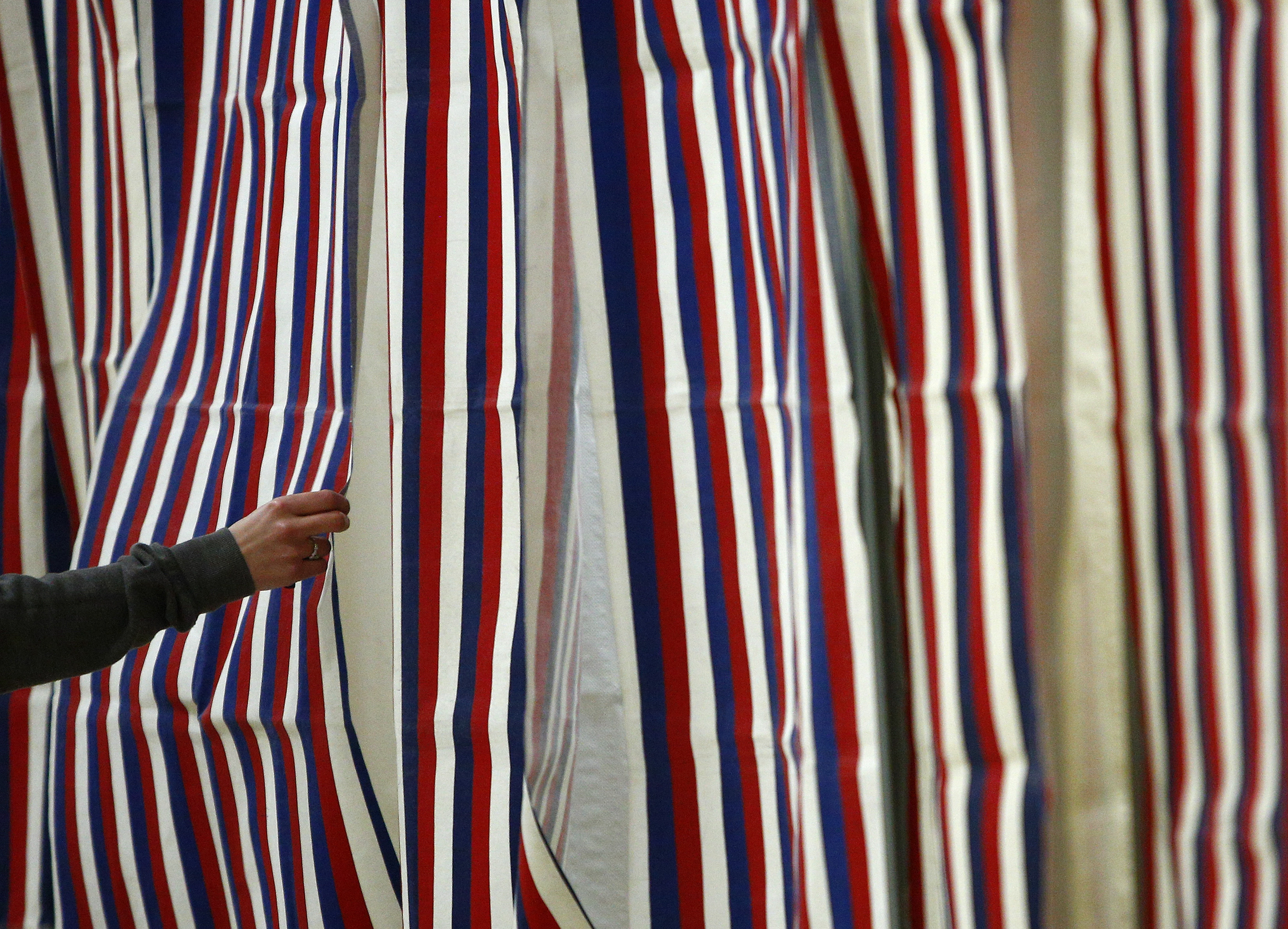Down with early voting!
Early voting actually doesn't increase turnout. And it really messes with vetting and winnowing.


A free daily email with the biggest news stories of the day – and the best features from TheWeek.com
You are now subscribed
Your newsletter sign-up was successful
The 2016 primary season has called attention to the ugly nitty-gritty of American election mechanics, from Democratic Party coin flips in Iowa to long lines and general chaos in the Republican caucuses in Nevada. But there's been little attention paid to one of the biggest electoral revelations to come out of this year's unusually crowded trainwreck of a Republican contest.
Early voting is a bad idea.
Early voting has become increasingly popular; in 2000, early votes accounted for only 15 percent of votes cast; by 2012, the percentage had more than doubled to 31.6 percent. Progressives in particular like early voting, since it seems to make voting easier, and offers a straightforward way to increase turnout. With more time to vote, the logic goes, more people will vote. It seems like common sense.
The Week
Escape your echo chamber. Get the facts behind the news, plus analysis from multiple perspectives.

Sign up for The Week's Free Newsletters
From our morning news briefing to a weekly Good News Newsletter, get the best of The Week delivered directly to your inbox.
From our morning news briefing to a weekly Good News Newsletter, get the best of The Week delivered directly to your inbox.
The truth, though, is that there is little evidence that early voting has much effect on the number of people voting. In fact, a 2013 study found that early voting actually lowered turnout. In part, this seems to be because it made election day seem less special, so fewer people turned out to vote. In part, early voting may have reduced campaign efforts to mobilize voters. In either case, Yanna Krupnikov, assistant professor of political science at Stony Brook University, told me, "The people who vote early are people who would have voted all along — so in other words, these are the same people we could count on to turn out in the general election." There are reforms which boost political participation, such as automatic registration. But early voting isn't one of them.
In a general election, early voting at worst reduces turnout slightly, and at best is superfluous. In primary elections, though, as we're learning this year, early voting can invalidate people's votes, and even rob voters of vital information which might affect elections.
In the United States, primary elections in the two major parties are designed to do two things. The first is vetting. Contests in early states provide party actors, and voters, with information about how candidates perform with different voters from different demographic groups and different regions. In 2008, Obama demonstrated in Iowa that he could win white voters, which encouraged donors, the party, and voters in later states to believe he could win a general election. Early states test candidates, and their success or failure in those tests is important information voters use later on.
The second purpose of primaries is winnowing. As candidates move through the primary process, losers realize they have no chance at the nomination and drop out. Chris Christie folded after New Hampshire; Jeb Bush folded after South Carolina. Once they depart, their voters have to move on to other candidates. As the field winnows, candidates who are broadly acceptable, rather than ones who inspire passion in a few, should gain strength.
A free daily email with the biggest news stories of the day – and the best features from TheWeek.com
But in a crowded, hotly contested primary like the 2016 Republican race, it turns out that early voting plays havoc with both winnowing and vetting.
The problem with winnowing is obvious. Early voting means that in many cases people are casting ballots for candidates who won't still be in the race come election day. For example, early voting for the Texas primary (held on March 1) began on Feb. 16. Jeb Bush didn't drop out of the race until the South Carolina primary on Feb. 20. That means that anyone who voted for Bush in Texas wasted their ballots.
More significantly, perhaps, Florida began its early voting on Feb. 29, even though actual primary day is March 15. If Marco Rubio's flailing campaign should shutter before then, his voters will lose a chance to cast their ballots — which is especially significant since Rubio appears to be ahead in early voting. It's true that despite rumors, it seems quite unlikely that Rubio will leave the race. But still, early voting has the potential to effectively disenfranchise some significant portion of the electorate — exactly the opposite of its intended purpose. This can lead to decreased faith in voting and suspicion of the process. As Krupnikov told me, "Learning new information after voting or learning that someone dropped out and you may have wasted your vote may lead to a lot of frustration for people. Even to the point where they become too risk averse to use early voting systems unless that is their only means of voting."
Early voting also interferes with the vetting function of the primary. Again, the point of running staggered contests is that later voters can use the process to learn more about the candidates. That's particularly important in a hotly contested primary.
And it's perhaps even more important this year, since one candidate, Donald Trump, has dominated media coverage to an unprecedented degree. The Trump-centered coverage is so unrelenting that many voters may not even know who the other candidates are. This may be part of the reason that Trump does so poorly with late-deciding voters. His weakness in this respect was illustrated most dramatically in Louisiana on Saturday, where Trump won early voters over Ted Cruz 46-23, but narrowly lost election day voters to Cruz 40.9-40.5.
It's difficult to determine why this shift happened exactly. Are Trump voters incredibly committed and so rush out early to vote for him, while other less decisive voters wait for election day? Or did voters who cast ballots between Feb. 20 and 27 in Louisiana trend Trump because they hadn't seen Romney's anti-Trump speech (March 3), or Trump's "I have a big penis" debate performance (also March 3), or the news coverage about his failure to repudiate the Klan (Feb. 29)?
There's no way to know if the outcome in Louisiana would have been different without early voting. But we do know that early voting doesn't increase turnout, and that it works against the primary process goals of winnowing and vetting. Early voting does little good, disenfranchises some, and interferes with the information-gathering function of the primary season. In primaries, if not in general elections, states should get rid of it.
Noah Berlatsky is a freelance writer whose work appears in The New Republic, The Guardian, and other venues. He is the author of Wonder Woman: Bondage and Feminism from Rutgers University Press.
-
 6 of the world’s most accessible destinations
6 of the world’s most accessible destinationsThe Week Recommends Experience all of Berlin, Singapore and Sydney
-
 How the FCC’s ‘equal time’ rule works
How the FCC’s ‘equal time’ rule worksIn the Spotlight The law is at the heart of the Colbert-CBS conflict
-
 What is the endgame in the DHS shutdown?
What is the endgame in the DHS shutdown?Today’s Big Question Democrats want to rein in ICE’s immigration crackdown
-
 The billionaires’ wealth tax: a catastrophe for California?
The billionaires’ wealth tax: a catastrophe for California?Talking Point Peter Thiel and Larry Page preparing to change state residency
-
 Bari Weiss’ ‘60 Minutes’ scandal is about more than one report
Bari Weiss’ ‘60 Minutes’ scandal is about more than one reportIN THE SPOTLIGHT By blocking an approved segment on a controversial prison holding US deportees in El Salvador, the editor-in-chief of CBS News has become the main story
-
 Has Zohran Mamdani shown the Democrats how to win again?
Has Zohran Mamdani shown the Democrats how to win again?Today’s Big Question New York City mayoral election touted as victory for left-wing populists but moderate centrist wins elsewhere present more complex path for Democratic Party
-
 Millions turn out for anti-Trump ‘No Kings’ rallies
Millions turn out for anti-Trump ‘No Kings’ ralliesSpeed Read An estimated 7 million people participated, 2 million more than at the first ‘No Kings’ protest in June
-
 Ghislaine Maxwell: angling for a Trump pardon
Ghislaine Maxwell: angling for a Trump pardonTalking Point Convicted sex trafficker's testimony could shed new light on president's links to Jeffrey Epstein
-
 The last words and final moments of 40 presidents
The last words and final moments of 40 presidentsThe Explainer Some are eloquent quotes worthy of the holders of the highest office in the nation, and others... aren't
-
 The JFK files: the truth at last?
The JFK files: the truth at last?In The Spotlight More than 64,000 previously classified documents relating the 1963 assassination of John F. Kennedy have been released by the Trump administration
-
 'Seriously, not literally': how should the world take Donald Trump?
'Seriously, not literally': how should the world take Donald Trump?Today's big question White House rhetoric and reality look likely to become increasingly blurred
